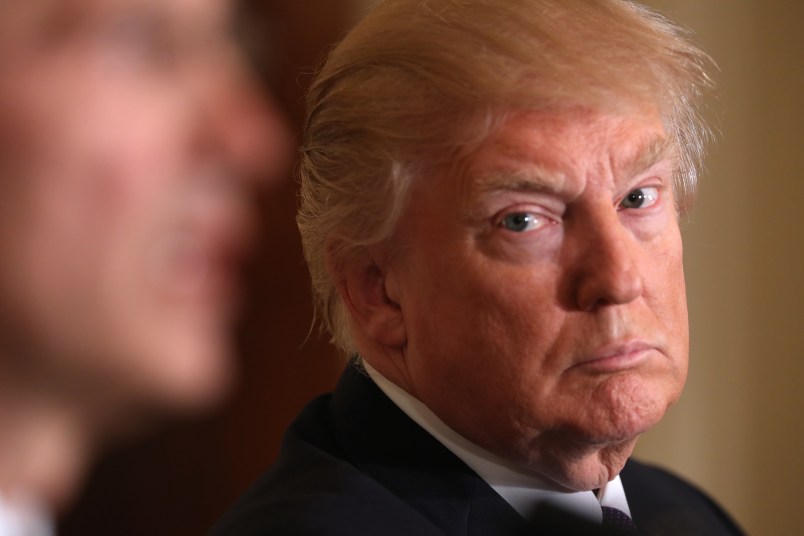Since the bombshell news dropped that James Comey was fired as director of the FBI, the White House has slowly shifted its narrative on the reasoning behind the move, placing more emphasis on President Donald Trump’s unhappiness with Comey.
In the initial aftermath, the White House emphasized the role of Deputy Attorney General Rod Rosenstein, insisting that he initiated a review of Comey without any direction from the White House. But the administration has started changing its tune, perhaps because Rosenstein threatened to quit when he realized the White House was pinning the decision on him, as the Washington Post reported Wednesday night.
Press Secretary Sean Spicer denied to reporters Tuesday night that Rosenstein acted on orders from the White House. And Deputy Press Secretary Sarah Huckabee Sanders emphasized in an interview Tuesday night that Trump acted on a recommendation from Rosenstein.
However, at the White House daily briefing Wednesday afternoon, Sanders shifted the narrative slightly, placing more emphasis on Trump’s unhappiness with Comey. She cited Comey’s inaccurate testimony during a hearing last week and his decision to hold a press conference in July 2016 to discuss the FBI’s findings in the Hillary Clinton email probe. She also acknowledged that Trump had been unhappy with Comey for a while and that “he’d been considering letting Director Comey go since the day he was elected.”
Later on Wednesday, the White House sent a timeline of the run-up to Comey’s firing to White House reporters that took some of the heat off of Rosenstein. Trump “lost confidence” in Comey “over the last several months” and “was strongly inclined to remove him” after his hearing on Capitol Hill last week, according to the White House timeline. Trump then met with Rosenstein and Attorney General Jeff Sessions on Monday where “they discussed reasons for removing the Director,” per the White House. The administration did not say who initiated the meeting about Comey, however. Rosenstein then sent his written recommendation to Sessions on Tuesday, per the White House.
Finally, on Thursday morning, Sanders told NBC’s “Today” that the decision to fire Comey rested solely with Trump.
“I’m not aware of that conversation, but I do know that the decision to fire Director Comey was the President’s and the President’s alone. Obviously he took their recommendation very seriously, but the President had been thinking about this since November, since he was elected president,” Sanders said when Matt Lauer asked about the Washington Post’s report that Rosenstein threatened to quit. “This was something he had considered. He had never been solidly on board with keeping Comey for the long term, and the erosion of confidence had been taking place over a long period of time.”
She also mentioned Comey’s testimony on the Hill last week and said that Trump asked for “feedback” from Sessions and Rosenstein. They spoke with the President and then he asked them for a written recommendation, Sanders told “Today.”
WATCH: “I do know that the decision to fire Director Comey was the president’s and the president’s alone.” @SarahHuckabee pic.twitter.com/bmWjFwxtYr
— TODAY (@TODAYshow) May 11, 2017
During an interview on ABC’s “Good Morning America,” co-host George Stephanopoulos noted to Sanders that the White House initially said that Rosenstein came up with the recommendation on Comey on his own.
“That wasn’t true, was it?” he asked.
“I think you’re putting things a little out of context here. The information in the letter was something that he came to on his own,” Sanders replied. “On Monday, they were at the White House for other meetings. The President asked them about their opinions on Comey. They told him. He asked for them to put that in writing, the conversation that they had had orally there at the White House on Monday. ”
“But it wasn’t directed or those — the words that were written weren’t at the direction necessarily of the President. Those were their own thoughts and ideas,” she added.
In response, Stephanopoulos noted that Spicer denied the White House had any involvement in Rosenstein’s decision and that Vice President Mike Pence suggested Rosenstein wrote the memo of his own volition, saying that he “came to work, sat down and made the recommendation.”
Stephanopoulos asked Sanders, “[Trump] directed him to write this memo, didn’t he?”
“He did not direct him to write the context of the memo. He asked him to put the comments that he had already made directly to the President in writing,” Sanders replied, adding that the memo included “original thoughts by Mr. Rosenstein.”
This post has been updated.










